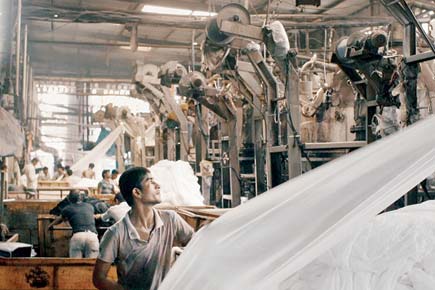Rahul Jain, in his debut docu-feature, brings the symphony of machines, and a familiar but relevant tale of exploitation

The first 20 minutes of Rahul Jain's debut docu-feature can only be described in onomatopoeic words — the crackle of fire, the swish of cloth, the rattle of machines. The soundscape that Jain builds for us is through an orchestra of the units in a textile factory. A space devoid of human voices, unless you count the interviews, seems to be the point that Jain, a 26-year-old filmmaker, seems to be driving at in Machines.
ADVERTISEMENT
In an hour and 10 minutes, Jain takes us into a textile factory in some part of Gujarat (our guess would be Surat). Migrant workers tinker away in exploitative and hazardous conditions, doling out metres of fabric that will be purchased by overseas customers. Their masters, or seths as they are known, are taskmasters who believe that their workers are a spoilt lot. Jain, who made the film as his thesis submission at the California Institute of the Arts, says that his interest in the subject was sparked off after the deadly collapse of Rana Plaza, a garments factory, in the Savar Upazila of Dhaka District, Bangladesh, in 2013. The accident left 1,134 dead and about 2,500 injured. "I wanted to see this from the inside. I didn't want to demean this kind of work, but there seems to be no avenue for the expression of one's personality in such a job. These people are living very compromised lives thinking that they are here by their own choice," says Jain.
Raised in New Delhi, Jain has relatives who own textile factories and had some memories of visits to these from his childhood. For the film, however, he spent two months in the factory, sans camera and crew, just absorbing the environment inside and earning the confidence of the workers. "What I heard in the factory jolted me out of my bourgeois comfort. Coming from a privileged class in India, we don't often think of how the other half lives. To ask these workers to 'tell me how you feel' seemed almost sarcastic," he says.
Stunning visuals, bleak reality
Machines had its world premiere at the Sundance Film Festival this year and won a special jury award for its cinematography in the World Cinema Documentary category. At its India premiere at the MAMI film festival later this month, audiences will be sure to note the contrast between the bleak lives of the workers, some of them child labourers, with the stunning visuals by Jain and Rodrigo Trejo Villanueva.
Whether this seems like a paean to the Industrial Revolution or a strong comment on how India is still trapped in the ghost of Victorian England, is something for us to decide. "One could make a film on exploitative labour in any unregulated industry and the story would be similar," says Jain. His next film is on similar lines, and will look at the kinds of pollution that the capital region is plagued with.
The symphony of the machines, as the young filmmaker puts it, is meant to create a strong fidelity to the actual space. If he experienced it as violently devastating to the ears, then the film eases it up for audiences.
The story Jain brings to the screen is perhaps all too familiar, but one that can benefit from retellings. At the heart of the film is the most important story, however. The migrant worker. He who doesn't belong to the state where the factory is situated. One worker boldly states that there are those who have come from Uttar Pradesh, Bihar, Bengal and Orissa. No mill would run if it wasn't for them. For these reasons, and more, Jain doesn't disclose the location of this factory. "Moreover, I want to show the kind of ruling structures that are at fault. I don't want to make a case out of this one factory instead of looking at it as a systemic problem," he says.
 Subscribe today by clicking the link and stay updated with the latest news!" Click here!
Subscribe today by clicking the link and stay updated with the latest news!" Click here!






